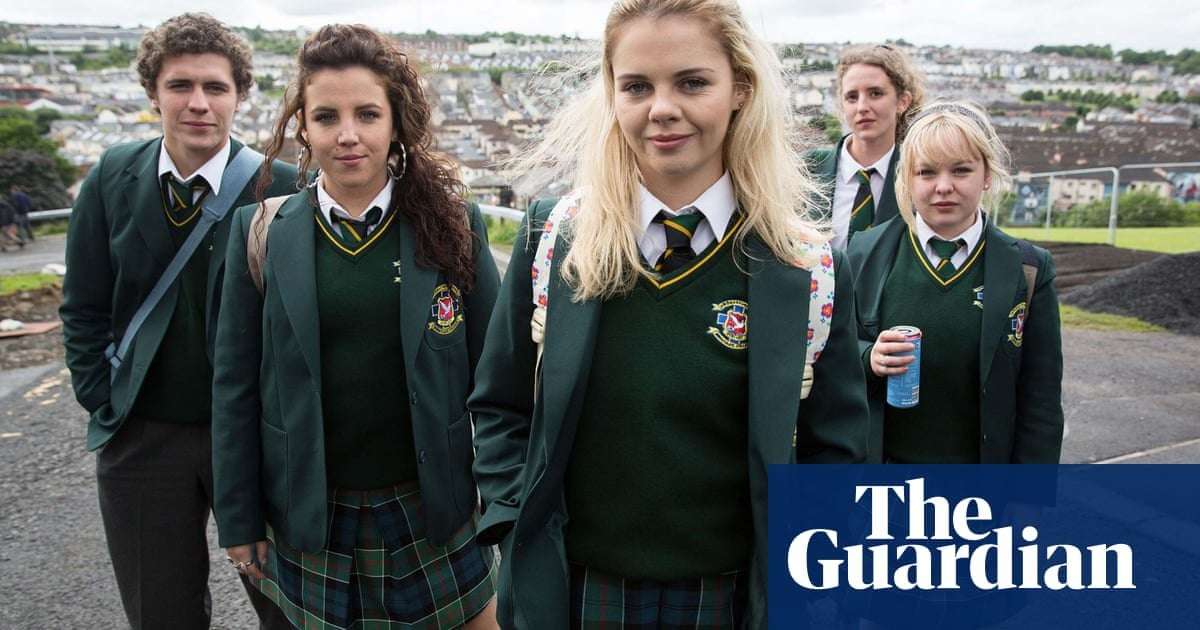Before Normal People had us ruminating on coming-of-age angst and awkward sexual chemistry of Irish teens, another show beat it to the punch
Derry Girls has been critically acclaimed (the first season holds a 100% rating on Rotten Tomatoes) and smashed ratings records in Ireland and the UK, but despite international distribution via Netflix it’s remained criminally under-watched – at least based on my metric of asking everyone I know if they’ve watched the show and being disappointed by the answers.
Extras: Ricky Gervais and Stephen Merchant's take on celebrity is still irreverent, clever fun Read more
Here’s the pitch I use to try to convince people to give it a go: “Imagine a show like The Inbetweeners but funnier, with a heartwarming and realistic portrayal of female friendship, that tackles heavy themes like politics, religion and war, and English people are the punchline of every second joke. Oh, and it has a great 90s soundtrack.”
The sitcom follows four teenage girls, Erin, Orla, Clare and Michelle, as they grapple with the universal problems of being a young adult: intrusive parents, strict Catholic school teachers, crushes, and violent sectarian conflict.
Or at least they’re the universal problems faced by teenagers living in Northern Ireland in the 1990s, which is when the show is set.
Facebook Twitter Pinterest Erin Quinn (Saoirse-Monica Jackson) and Orla McCool (Louisa Harland) in Derry Girls. Photograph: Peter Marley/Channel 4
Derry Girls’ genius is its ability to perfectly balance genuinely hilarious moments of teenage humour, wholesome meditations on friendship and love, and coming-out stories alongside a serious engagement with the politics of the era.
If you didn’t think jokes about teenage romance could be bolstered by a long-running religious conflict, you haven’t heard Michelle defend her crush on a Protestant: “I think there’s something really sexy about the fact that they hate us so much.”
Created and written by Lisa McGee, the show is inspired by her own childhood growing up in Derry during the Troubles, a conflict generally considered to have begun when the city’s Catholic majority protested against Protestant political rule in 1969, sparking the Battle of Bogside.
Three years later British soldiers shot 26 unarmed Catholic protesters in Derry, killing 13. The event is known as Bloody Sunday and it had a galvanising impact on the Irish republican movement.
The legacy of these events is never far away in Derry Girls. Shots of British soldiers patrolling the streets feature in most episodes, and radio and TV news broadcasts of the conflict regularly punctuate family dinners.
Facebook Twitter Pinterest Dylan Llewellyn (James Maguire), the only boy in a Catholic girls’ school. Photograph: Peter Marley/Channel 4
It even creeps into school life. “Nobody actually gets expelled,” Michelle says. “Rhonda Gallagher hasn’t even been expelled and she’s in the IRA.”
“I’d say that’s probably why,” Erin replies.
One of the show’s highlights is the relationship between the girls and Michelle’s cousin James. He serves as the show’s punching bag not only because he’s the only boy in a Catholic girls’ school (“Why can’t I find the boys’ toilet?”) but also because he’s an Englishman surrounded by Irish nationalists.
“I can’t tell my rebellions from my risings,” he mourns during one group work assignment.
“And whose fault is that?” Michelle fires back. “If your lot had stopped invading us for five fucking minutes there’d be a lot less to wade through! English prick.”
The 90s setting gives us more than just an examination of the effects of the Troubles on school kids, though. It allows us to wade in nostalgia, and simultaneously marvel and cringe at the fashion and aesthetics of the era. It’s a useful device to help create atmosphere, but it never feels tokenistic – all the cultural references help deliver an emotional impact, and that’s most obvious in the music choices.
Facebook Twitter Pinterest Derry Girls’ genius is its ability to perfectly balance moments of teenage humour with the politics of the era. Photograph: Peter Marley/Channel 4
The soundtrack is full of classic 90s acts such as Ace of Base, Blur, Cypress Hill, Salt-N-Pepa and, of course, the Corrs. But the best choice of music is saved for the first season’s emotional finale.
The girls are performing a dance to Madonna’s Like A Prayer for their Catholic school’s talent show, a perfect way to express the bonds of their friendship. It’s a musical choice loaded with symbolism given the song’s music video led to a Vatican-initiated boycott campaign and protests around the world by Catholics.
Crash Landing On You: parachute into this addictively romantic South Korean soap opera Read more
As the girls are dancing on stage, the show abruptly cuts to Erin’s family watching a news broadcast of a bombing that’s just taken place and Dreams by the Cranberries starts drowning out Madonna.
The grief and resignation on the faces of Erin’s parents is a stark contrast to the sheer and absolute joy that only dancing with your friends to iconic pop music can bring. The fact that Derry Girls can regularly pull off these moments of fun and hilarity, and in the same breath force us to reckon with the impact of political violence is why it’s such an irresistible show.
• Derry Girls is streaming in Australia on Netflix

gallon-of-vinegar on May 18th, 2020 at 05:46 UTC »
“I am not being an individual on my own!”
Look_to_the_Stars on May 18th, 2020 at 05:11 UTC »
“Unfortunately I will be unable to attend this trip to Paris as I despise the French.”
nopantsirl on May 18th, 2020 at 03:29 UTC »
Underrated is the wrong word. I've only heard praise for Derry Girls. It's underexposed.